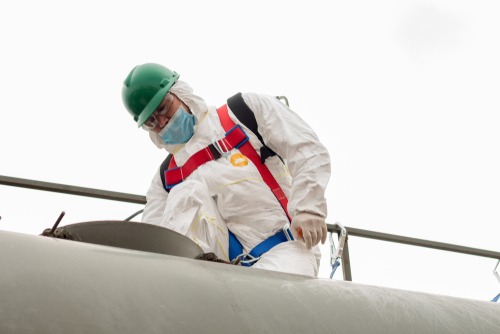
The Senate Homeland Security and Governmental Affairs Committee held a hearing recently to examine the harmful impacts of Perfluoroalkyl and Polyfluoroalkyl Substances (PFAS) at military sites.
U.S. Sen. Gary Peters (D-MI) convened the hearing after a Department of Defense (DoD) Inspector General report said the DoD failed to adequately control PFAS contamination at military sites across the nation. At the hearing, Peters raised the need to hold DoD accountable for its failure to act. He also said they must do more to help clean up contaminated sites.
“Exposure to these chemicals, whether through contact with firefighting foam, or contamination found in groundwater sources, presents serious health and environmental risks to first responders, servicemembers, their families, and the communities surrounding these military sites,” Peters said during his opening statement. “According to this report, despite having information that PFAS exposure presented concerning health and environmental risks, the Department of Defense failed to warn servicemembers, their families, and local communities about these potential risks for five years – unnecessarily putting them in harm’s way.”
The hearing featured two panels. The first panel included federal government witnesses from DoD. Peters questioned federal government witnesses about the findings and recommendations in the Inspector General report. He also asked why DoD failed to alert people about potential harm or exposure to PFAS from military sites on a timely basis and pressed witnesses on why DoD continues to delay remediation efforts at military sites.
The second panel consisted of state-level independent experts, including Tony Spaniola, co-chair of the Great Lakes PFAS Action Network. Spaniola discussed how PFAS has caused significant harm to Michigan communities. For example, he said it has contaminated local water supplies as well as fish and wildlife due to firefighting activities at the now decommissioned Wurtsmith Air Force Base in Oscoda. He also cited other sites across the state, including Camp Grayling, Selfridge Air National Guard Base, K.I. Sawyer Air Force Base and the Alpena Regional Airport. Spaniola said PFAS have been found in every Great Lake, and more than 2 million Michigan residents have been exposed to PFAS contamination in their drinking water.
“Moving forward, there is more the Department could do to expand their blood testing plan to better track the long-term health consequences of PFAS exposure. Finally, the Department of Defense must do more to work collaboratively with communities and state and local stakeholders who have suffered from PFAS contamination over the years,” Peters said.
The committee discussed what more lawmakers could do to ensure the federal government – including DoD – is working with local governments and organizations to combat the PFAS crisis.




